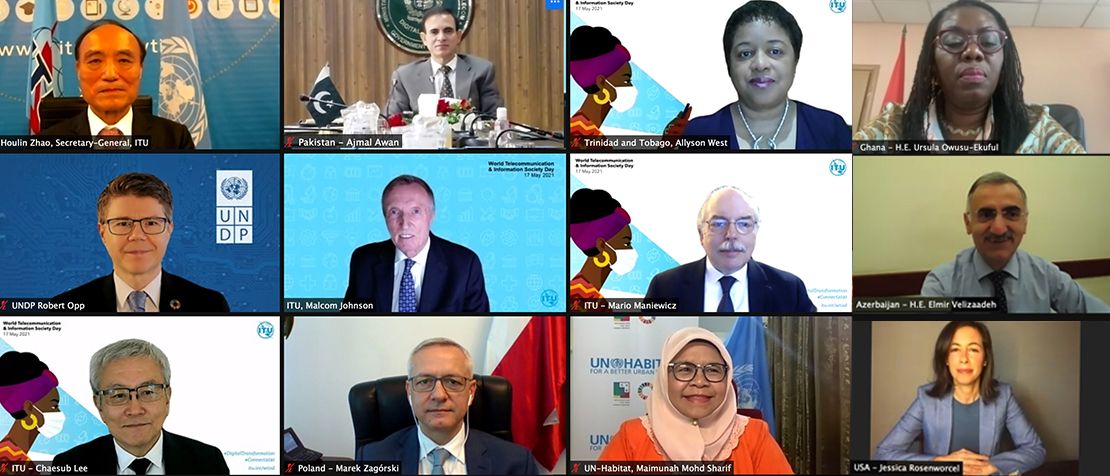
How countries are stepping up digital transformation
Taking stock of a period when many aspects of life have gone digital, this year’s World Telecommunication and Information Society Day (WTISD) focused on accelerating this digital transformation during these challenging times.
Celebrated every 17 May since 1969, the day marks the founding of the International Telecommunication Union (ITU) and the signing of the first International Telegraph Convention in 1865.
In his statement marking WTISD-21, Secretary-General of the United Nations António Guterres put it:
“Digital technologies sustain life, work, health and learning for billions of people…Yet nearly half the world’s population remains unconnected.”
The challenge of connecting those 3.7 billion has been exacerbated by the past year’s COVID-19 pandemic. Despite these setbacks, we must now pick up the pace, urged ITU Secretary-General Houlin Zhao, or “it will be very difficult to achieve the Sustainable Development Goals and connect the other half of humanity by 2030.”
He called for a much-needed new mindset and a strategy to promote investment in information and communication technologies (ICTs), encouraging all actors to make the best use of limited resources to connect the unconnected.
This year’s WTISD theme is also about meaningfully advancing the goals and targets of the Union’s Connect 2030 Agenda and the United Nations Sustainable Development Goals (SDGs). ICTs can serve all 17 of the SDGs to ensure a healthier, more equitable, sustainable future.
Investing in affordable connectivity
Investing in digital services makes a good starting point, from digital government to faster broadband, which the pandemic has proved a must-have, not just a nice-to-have. Other countries are promoting digital transformation at government agencies, aiming to serve citizens more efficiently. Trinidad and Tobago quadrupled the capital budget of the Ministry of Public Administration and Digital Transformation “to ensure that we can provide the support and build out the infrastructure we need to create a digitally transformed society,” said Minister and Senator Allyson West.
Citizen-driven, human-centred inclusivity
Investments in digital infrastructure must be inclusive. “Digital technologies have the potential to serve people, improve public services and working conditions,” said Maimunah Mohd Sharif, Executive Director of the United Nations Human Settlements Programme (UN-Habitat). Thanking ITU for its support to UN-Habitat’s New Urban Agenda initiative, she added: “We must put people first.” Robert Opp, Chief Digital Officer at the United Nations Development Programme (UNDP), added:
“Reaching a sustainable digital transformation requires taking a whole-of-society, inclusive approach to ensure that the potential reaches all levels of society.”
But what does that look like?
For some, it means a leap to all-encompassing digitalization. Ghana’s Minister of Communications and Digitalization, Ursula Owusu-Ekuful, noted a range of new policy drives, including the electronic ID project that has registered about 17 million of her country’s 30 million citizens. The “single identity document” serves for myriad public sector transactions, including vehicle licensing, health insurance, social security, and passports.
Building rural digital infrastructure
Azerbaijan has embarked on several digital transformation initiatives, according to its Deputy Minister of Transport, Communications and High Technologies, Elmir Velizade. One involves a partnership with ITU to build smart, sustainable cities and villages on 20 per cent of the country’s territory, he said.
All countries suffer from connectivity gaps to some degree.
Accurate broadband coverage maps are one way to target digital policy solutions effectively. Asking consumers, along with network operators, to identify service gaps can make rural digital infrastructure more citizen-centric and inclusive.
Innovation to bridge homework gaps
In the United States, nearly 17 million children lack reliable or consistent Internet access at home, creating what Jessica Rosenworcel, Acting Chairwoman of the US Federal Communications Commission (FCC), calls a ‘homework gap’ locking children out of the virtual classroom. To close it, the FCC has established an emergency connectivity fund to provide schools and libraries with digital resources, from devices to broadband connectivity. To tackle the same issue in Poland, the government provided students with over 250,000 laptops and tablets and worked to ensure every school could benefit from high-speed Internet access amid COVID-19, said Marek Zagorski, Secretary of State of the Government Plenipotentiary for Cybersecurity in the Chancellery of the Prime Minister. Pakistan’s Ministry of Information Technology and Telecommunication is taking a broader approach to boost digital skills. The DigiSkills.pk online portal has already delivered 1.5 million training sessions, noted Ajmal Awan, who oversees International Coordination at the Ministry.
Working together, we succeed
On World Telecommunication and Information Society Day, UN Secretary-General Guterres called on us to commit to work together to defeat COVID-19 and ensure that digital technologies are a force for good that help us to achieve the Sustainable Development Goals and leave no one behind.
ITU Deputy Secretary-General Malcolm Johnson, in concluding, stated: “This year, more than any previous year, we have reason to celebrate the benefits of ICTs that are helping people and economies overcome the terrible challenges we are all facing. One thing that COVID has clearly shown us is that we are all dependent on each other, so multilateralism is more important now than ever before. And so is ITU’s role – more than ever before in our long history.”
ITU looks forward to further accelerating digital transformation together with our members, partners and stakeholders throughout the year.
Keep sharing your stories of digital transformation with ITU by contacting us here.
